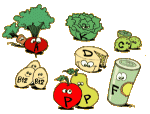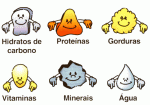Regarding foods, and consequently nutrients, which are deficient in the diet of the Brazilian population, the POF (Family Budget Survey) 2008-2009 revealed that there is a high prevalence of inadequate micronutrient intake in all major regions of the country, reflecting thus the low quality of the Brazilian diet.
Among individuals aged over 60 years, the nutrients with the highest percentage of inadequacy were vitamins E, D and calcium, for both men and women, in urban and rural areas. For adolescents of both sexes, vitamins A, E, C and D had a high percentage of inadequacy. Among minerals, calcium is the most deficient in the Brazilian diet.
Vitamin E
It is a fat-soluble vitamin, whose main function is antioxidant action, that is, it donates electrons to free radicals, which are unstable molecules that attack cell membranes precisely to “steal” electrons, thus causing various problems, such as example, cellular aging.
Vitamin E is found in vegetable oils (peanut, soybean, palm, corn, safflower, sunflower, etc.) and wheat germ. Secondary sources are nuts, seeds, whole grains, and green leafy vegetables. Some staple foods, such as milk and eggs, contain small amounts of this vitamin.
Vitamin D
It is also a fat-soluble vitamin, formed from cholesterol, whose functions are the absorption of calcium and phosphorus in the large intestine, their mobilization in the bones and their reabsorption in the kidneys. Through these three functions, vitamin D plays an important role in ensuring the correct functioning of muscles, bone mass, nerves, blood clotting, cell growth and energy utilization.
The richest natural sources of vitamin D are fish liver oils and saltwater fish, such as sardines, herring, salmon and mackerel. Eggs, meat, milk and butter also contain small amounts. Plants are poor sources and fruits and nuts are not sources of vitamin D.
Healthy people, with regular exposure to the sun (15 minutes/day) and under appropriate conditions (before 10:00 am and after 4:00 pm, if possible) do not need vitamin D in the diet.
Vitamin A
Vitamin A, like vitamin E and D, is fat-soluble. It is found in two forms, retinol, found only in animal sources, and certain carotenoids (or provitamins, which must be converted to the active form, which is retinol), which are found only in plant sources. Its main functions are: formation of visual cells, cell growth, tissue differentiation and antioxidant action.
Foods rich in carotenoids include carrots, dark green and yellow leafy vegetables (spinach and broccoli), pumpkin and melon. Active vitamin A, or retinol, can be found in food sources of animal origin such as liver, egg yolks, whole milk and butter. 
Vitamin C
Unlike the vitamins above, vitamin C is water-soluble. Just like vitamins E and A, it has antioxidant action and several other functions such as collagen synthesis, participation in metabolic reactions of certain amino acids, in addition to increasing the absorption of iron from plant foods.
The source of vitamin C is found almost exclusively in plant foods such as guava, acerola, strawberry, orange, tomato, pepper, mango, cashew, orange, lemon, chicory, kale, yam, among others, and also in honey.
If you notice, 3 of the 4 deficient vitamins in Brazilians' diets are fat-soluble, that is, they require fat to be absorbed. Therefore, restricted diets in which fats are completely excluded from your diet will not bring any benefit to your health, on the contrary, they will harm all the functions listed above, leading to serious health problems! Therefore, before taking any action regarding changing your diet, consult a nutritionist.
In the next post we will talk about minerals (calcium, phosphorus and magnesium). Don't miss it!
Sources
Family budget survey 2008 – 2009. Analysis of personal food consumption.
http://www.sonutricao.com.br/downloads/Guia_Alimentar_Populacao_Brasileira.pdf
http://www.vitaminas.bayer.pt/scripts/pages/pt/vitaminas/vitamina_e/index.php
